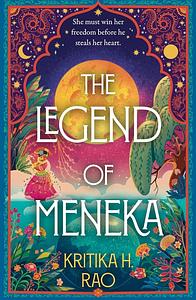You need to sign in or sign up before continuing.
Take a photo of a barcode or cover
medium-paced
Plot or Character Driven:
Character
Strong character development:
Yes
Loveable characters:
Complicated
Diverse cast of characters:
Yes
Flaws of characters a main focus:
Yes
If you’re familiar w Hindu mythology, especially the churning of the ocean story, you know that Menaka (written in this book as Meneka, pronounced the same way) was a product of the ocean. The gods, Indra in particular, grows fearful of sage Kaushika/Vishwamitra’s powers and sends Menaka down to seduce and distract him.
Unfortunately, Menaka has an incredibly tragic ending in the myths: she and Kaushika fall in love for real and she gives birth to a daughter — Shakuntala, who later grows up and married King Dushyant, who she has a son with named Bharata (ie where India’s alternate name comes from). Anyway, Kaushika is NOT happy with the deception even though they both actually love each other now, and he curses her to always be away from him.
Kritika Rao’s book divulges from the original myth and gives Menaka agency that she never had before. Menaka was always at the whim of a man, whether it be Indra or Kaushika. Menaka discovers her freedom, with the help of Kaushika.
I do have to warn people that this is not a YA, it’s advertised as a romantasy so expect a handful of steamy scenes.
Additional note: Hindu myths are often narrated with a high level of detachment, with emotions taking ZERO priority in the narrative. When authors write retellings of these myths, they have to introduce feelings and emotions into the stories that don’t exist in the original texts. If you’re ever confused about a character’s motivations or thoughts and feelings, just know that the source material doesn’t give you much to work with.
Unfortunately, Menaka has an incredibly tragic ending in the myths: she and Kaushika fall in love for real and she gives birth to a daughter — Shakuntala, who later grows up and married King Dushyant, who she has a son with named Bharata (ie where India’s alternate name comes from). Anyway, Kaushika is NOT happy with the deception even though they both actually love each other now, and he curses her to always be away from him.
Kritika Rao’s book divulges from the original myth and gives Menaka agency that she never had before. Menaka was always at the whim of a man, whether it be Indra or Kaushika. Menaka discovers her freedom, with the help of Kaushika.
I do have to warn people that this is not a YA, it’s advertised as a romantasy so expect a handful of steamy scenes.
Additional note: Hindu myths are often narrated with a high level of detachment, with emotions taking ZERO priority in the narrative. When authors write retellings of these myths, they have to introduce feelings and emotions into the stories that don’t exist in the original texts. If you’re ever confused about a character’s motivations or thoughts and feelings, just know that the source material doesn’t give you much to work with.
adventurous
emotional
hopeful
inspiring
tense
medium-paced
Plot or Character Driven:
A mix
Strong character development:
Yes
Loveable characters:
Yes
Diverse cast of characters:
Yes
Flaws of characters a main focus:
Yes
Legend of Meneka is a fantastic read, a wild adventure full of love, hope, devotion, and wild emotion. The novels overall message is that love comes in every shape and form, and all of it is divinely inspired and worthy of celebration. It spins a grand tale of learning to love oneself as much as one loves others. That love comes with its own difficulties and is a practice as much as an emotion.
The story begins with a young beautiful celestial who struggles against what she is told is her nature, of lust and devouring appetites. Meneka is a gentle and tender being who loves as deeply as she questions the world around her. She struggles to understand and see herself for who she is, much like any other person. As she grows into herself and learns more about the truth of the works around her she finds herself in emotional turmoil trying to reconcile the many parts of herself, which, i find deeply relatable and that many readers will love and feel with her.
Meneka and Kaushika's romance is organic and bursting with raw chemistry; their personalities oppositional yet complementary. The transition from enemies to lovers progresses naturally and healthfully. I enjoyed that this romance though the pair squabble and fight never enters abusive territory. They both learn an grow from one another and bring out the best in each other. Each page makes the reader yearn with Meneka for ger budding forbidden love for her target. At times the innocent and pure pining from her to Kaushika reminded me of my own first crushes and made me blush at times.
I loved how this story ended and it brought together all of the emotions and to me ends with hope and love. There is a wide variety of queer characters; nonbinary, trans, gay men, gay women and I loved all of them. The representation is organic and tender, the characters are all their own people and matter to the plot instead of being tokens or cheap punches.
The only reason I marked this 4 out of 5 is some of the smut is written a bit clumsy for me personally. Phrases like "just there" , "my entrance", "my folds" , "tongue savaging" zonked me out of the scenes that took several hundred pages to build. They weren't bad and I was excited to read them after so much thoughtful build up and masterful pining.
Otherwise a great read!
The story begins with a young beautiful celestial who struggles against what she is told is her nature, of lust and devouring appetites. Meneka is a gentle and tender being who loves as deeply as she questions the world around her. She struggles to understand and see herself for who she is, much like any other person. As she grows into herself and learns more about the truth of the works around her she finds herself in emotional turmoil trying to reconcile the many parts of herself, which, i find deeply relatable and that many readers will love and feel with her.
Meneka and Kaushika's romance is organic and bursting with raw chemistry; their personalities oppositional yet complementary. The transition from enemies to lovers progresses naturally and healthfully. I enjoyed that this romance though the pair squabble and fight never enters abusive territory. They both learn an grow from one another and bring out the best in each other. Each page makes the reader yearn with Meneka for ger budding forbidden love for her target. At times the innocent and pure pining from her to Kaushika reminded me of my own first crushes and made me blush at times.
I loved how this story ended and it brought together all of the emotions and to me ends with hope and love. There is a wide variety of queer characters; nonbinary, trans, gay men, gay women and I loved all of them. The representation is organic and tender, the characters are all their own people and matter to the plot instead of being tokens or cheap punches.
The only reason I marked this 4 out of 5 is some of the smut is written a bit clumsy for me personally. Phrases like "just there" , "my entrance", "my folds" , "tongue savaging" zonked me out of the scenes that took several hundred pages to build. They weren't bad and I was excited to read them after so much thoughtful build up and masterful pining.
Otherwise a great read!
adventurous
tense
slow-paced
Plot or Character Driven:
A mix
Strong character development:
Complicated
Loveable characters:
Complicated
Diverse cast of characters:
N/A
Flaws of characters a main focus:
Complicated
Loved:
- The mythology as a whole. The dichotomy of the immortals vs the immortals and how they coexist was interesting
- Meneka was a really well fleshed out character and I thought her journey of self-discovery was interesting and enjoyable to follow
- The prose was gorgeous. Honestly, the prose greatly outweighed the execution of the story, in my opinion. I’ll talk about it about in a later section, but this book took quite a while to really take off and then it felt like a whirlwind. If not for the beauty of the prose, I don’t think this book would have been able to sustain that
- Kaushika was also a pretty interesting character. I am, probably unsurprisingly, not super away of the real life mythology of his character, but I found his character development to be pretty fascinating.
- This book is queer without feeling forced (though there could be some arguments of this book having a bit of queer baiting, I think that's a matter of personal opinion)
Loathed:
- There’s a lot of characters in Kaushika’s camp to keep track of and I don’t think they were unique or discernible enough from each other. Honestly, I wanted a bit more personality from nearly everyone in this book with the exception of the love triangle.
- The depiction of seduction felt really flat at some points. I was really fascinated by Meneka’s ability to unearth another person’s inner lust and that in itself was really intriguing, but the actual seduction aspect was really…confusing, honestly. It wasn’t really explored beyond the inner lust and I wanted to understand the actual process of Meneka’s seduction as a power
- Why is she all of a sudden “in love” with him? Is this a fault of the original mythology or is it just a fault of the romantasy genre? This felt like it was just more prolonged lust than anything, especially “love”. What about him informed her “falling in love with him”? And recognizing that she *was* in love with him? I just don’t understand
- The progression of the story is really clunky. I mentioned this a smidge earlier, but with how lovely the prose is, it’s a bit disappointing that the story is just lacking really solid momentum. The middle act drags quite a bit and the beginning doesn’t really get you into the story effectively enough to be fully immerse, in my opinion. Again, the prose is beautiful enough to keep you going, but I wish that the story progression matched that level
Longed For:
- I really wished for more with the depictions of her dance power in this story. It’s so important to Meneka’s being, but the descriptions don’t follow the beauty of the rest of the prose. It feels like the author was really holding back in describing the act of the dance itself. And that’s a bummer to me. It’s such a wonderful concept and so deeply rooted in Hindu culture (like the majority of the rest of the book, obviously)
- More exploration/exposition into the relationship between the immortals and the mortals, if not just the relationships among immortals. It’s so interesting to me and maybe it’s more ingrained in the actual mythos of the story, but I think more of the politicking of those two factions could have been really interesting
- More description or exploration into why and how Kaushika falls for Meneka beyond just the obvious “she hot”
Will I read the next one? : Possibly. Like I’ve mentioned ad nauseum, the prose is just so good. I think it depends on the stoyr, but if it’s another mythology retelling then I will probably check it out
*Thank you to Harper Voyager, NetGalley, & the author for providing this ARC!
Graphic: Sexual content, Gaslighting, War
Moderate: Death, Violence
2025 reads: 18/300
2025 tbr: 9/111
i received an advanced review copy from the publisher via netgalley in exchange for an honest review. this did not affect my rating.
across the mortal and immortal realms, celestial dancers, known as apsaras, are revered for their beauty and magic. as one of these apsaras, meneka knows there’s more to it than that. lord indra, king of heaven, uses her and other apsaras to seduce his enemies for his own gain. meneka hates what she does, so she strikes a deal: she will seduce a mortal sage, whose growing power threatens lord indra, and she will be allowed to forego future missions. it seems easy enough, but as meneka gets to know the sage, kaushika, she starts to feel like killing him won’t be as easy as she thought.
as a huge fan of the “i was sent to kill you but instead i’m falling for you” trope, this book seemed like something i’d really enjoy. sure enough, the angst levels were perfect for this adult romantasy. i also love reading about mythology, so i was excited that this book was rooted in hindu mythology. i don’t read a lot of books based on this type of mythology, so i wasn’t familiar with the apsaras that are the main point of this book, but i really enjoyed reading about them in this novel.
i would recommend this to adult romantasy readers, especially if you enjoy mythology! i’m looking forward to book two.
2025 tbr: 9/111
i received an advanced review copy from the publisher via netgalley in exchange for an honest review. this did not affect my rating.
across the mortal and immortal realms, celestial dancers, known as apsaras, are revered for their beauty and magic. as one of these apsaras, meneka knows there’s more to it than that. lord indra, king of heaven, uses her and other apsaras to seduce his enemies for his own gain. meneka hates what she does, so she strikes a deal: she will seduce a mortal sage, whose growing power threatens lord indra, and she will be allowed to forego future missions. it seems easy enough, but as meneka gets to know the sage, kaushika, she starts to feel like killing him won’t be as easy as she thought.
as a huge fan of the “i was sent to kill you but instead i’m falling for you” trope, this book seemed like something i’d really enjoy. sure enough, the angst levels were perfect for this adult romantasy. i also love reading about mythology, so i was excited that this book was rooted in hindu mythology. i don’t read a lot of books based on this type of mythology, so i wasn’t familiar with the apsaras that are the main point of this book, but i really enjoyed reading about them in this novel.
i would recommend this to adult romantasy readers, especially if you enjoy mythology! i’m looking forward to book two.
emotional
informative
inspiring
reflective
slow-paced
4.5 Stars (considering the average rating, I'm rounding up)
One Liner: Full stars for the Shiva chapter
Meneka is one of the apsaras of Indra’s court and a powerful weapon. Her power is the art of seduction – to use dance and illusion to defeat Indra’s enemies and prevent heaven from losing its magic. However, Meneka no longer wants to do this. She wants to stay in Amaravathi, Indra’s kingdom, and use her talents there.
However, Indra offers her a deal – seduce Kaushika and prove her devotion to Amaravthi to get what she wants. Meneka agrees knowing the new mission is near impossible. Kaushika may have become a sage but he was a well-feared Kshatriya with warrior instincts. By channeling the same intensity, he became a sage with tremendous magic intent on waging war against Indra.
Will Meneka be successful in her mission or will she get more than what she bargained for and at what cost?
The story comes in Meneka’s first-person POV in the present tense.
My Thoughts:
Though I’m wary of retellings exploring Hindu Puranic and Ithihasic stories, I did want to try this after someone recommended the author’s previous books. The lower rating scared and worried me. NGL, I postponed this to read closer to the pub date as I didn’t want a repeat of Kaikeyi.
Patel’s Kaikeyi is nothing more than a distorted and colonized take on something sacred to my culture. All those comparing Legend of Meneka to that nonsense in a perfumed package have absolutely missed all the nuances that make this a Hindu book. The sad state is that even the official promotion does it!
Moreover, marketing this book using popular tropes has done it a disservice. I know, readers need a checklist these days; the tags are important; the comparisons are important; even more than the book itself. But, a book is much more than its tropes.
Enemies to lovers, romantasy, cozy fantasy, spicy, et al… well, the tags are right but only if you know the core context. Otherwise, these won’t make sense or feel incorrect.
Legend of Meneka is not just lust, seduction, or spice. It is an exploration of sringara and Kama at physical, emotional, spiritual, and cosmic levels. It is the celebration of the union of divine masculine and divine feminine without which this universe wouldn’t exist. When it talks of Shiva and Shakti in terms of lingam and yoni, it transcends the mortal desire for flesh and sexual gratification. It is the pulsing life that ensures the universe thrums with neverending energy to prevent self-destruction. Without the union of Shiva and Shakti, there is no life, no prana, no jeeva, and no prakriti. Love is too small a word to encompass the relationship of Shiva and Shakti. They are two halves of a whole, the Ardhanareeshwara, the perfect balance of divine masculine and divine feminine.
Though the author uses the word lust in the story, she switches to the actual term in her note –Kama. Lust doesn’t define Kama as it is only a part of it. Kama is one of the Purusharthas (Dharma, Artha, Kama, and Moksha) and a part of our lives. We have only reduced their true meanings with our incorrect translations to English. Lust might be a sin but Kama is necessary and has to be balanced with Dharma and Artha to travel the path to Moksha (Artha and Kama have to be discarded at the appropriate stage). Kama is not limited to physical and material aspects; it never has been.
When something so intricate and integral to Hinduism is removed from its framework, the result is a diluted and surface-level narrative that limits the story to the physical realm. Those unfamiliar with the core details miss out on the nuance; it doesn’t exist for them. It’s much like how yoga became a billion-dollar industry of stretching exercises with fancy and exotic names. It has no soul. Similarly, when the Hindu framework is removed/ ignored/ avoided, this book ends up as a weak YA story of a whiny heroine and a grumpy hero.
Before I dive into the details, let me share a short version of the original. This isn’t an individual story but is mentioned in different places as a part of the backstory.
Summary of the Original
Kaushika aka Vishwamitra is a king who left his Kshatriya dharma to become the best rishi in the world. He wanted to become Brahmarishi (think of it as a topmost title) and be called this by Vashishta. Kaushika as a king once visited Vashishta’s ashram, and something happened. This makes him determined to be the greatest rishi (never mind that the concept of being a rishi is to denounce such traits, something he learns after a long time). He attains a higher state through penance but loses it when he helps a king called Trishanku by creating an exclusive heaven for him. He starts fresh again and wants to show Indra and others what he is capable of.
Indra isn’t going to sit idle, right? He sends Meneka to disrupt Kaushika’s penance. If Kaushika had really given up worldly pleasures, he wouldn’t be swayed and might become worthy of the title he seeks. If not, well…
Meneka goes to seduce Kaushika and the result is their baby girl Shakuntala. Meneka leaves the newborn outside Rishi Kanva’s ashram and returns to heaven. Kaushika starts his tapasya once again, finally proves his worth, and becomes Vishwamitra the Brahmarishi.
The cookie-cutter version makes it seem like Kaushika and Meneka had a one-nighter or a fling. However, it was likely to be an affair that lasted a solid few months or years that ended with Meneka’s pregnancy/ Shakuntala’s birth.
The second half dealing with Indra sending Meneka to Kaushika is provided as a backstory in Shakuntala’s story in the Mahabharata (Adi Parva). The first half can be found in the Ramayana.
The author took different versions of this story and used creative liberties to spin a tale of magic, love, lust, seduction, and power strongly rooted in Hinduism.
While her MMC retained the core traits of Kaushika, she gave her own spin to Meneka (which is where I believe things went a bit south).
Characters
Kaushika is a Kshatriya turned Brahmin. The blend of both has given him an advantage and a disadvantage. I don’t use the terms in the ‘caste’ sense. Not even varna or jati. I talk of them as gunas (personality traits). A Kshatriya is a warrior born and trained to protect, rule, govern, and spends most of his years as a grihasta (a married man). A Brahmin is leaner born and trained to study, acquire knowledge, gain wisdom, and attain a balance of mind that prevents partiality, pride, anger, and grief. It’s a life-long tapasya to constantly improve oneself; not for accolades but for the peace felt when one separates themselves from the rest of the world.
Those who know Vishwamitra (even the movies/ TV version should be enough) can easily see Kaushika. The aloof grumpy hero with a temper is not an archetype. It is him. It is who he is, and has always been. The author retained his essence perfectly. I had zero issues visualizing him as I read the book.
She did the same for Indra – who can be a hero, villain, or both. He is a complicated deva with an abundance of grey shades. After all, he is my god even if he is not my God. Rambha is much like how I expect an apsara to be.
I think the issue lies with Meneka’s characterization. Since we don’t get much information about her, the author created someone vulnerable and naïve possibly to showcase her growth. A great idea. However, the execution makes her sound whiny at times. While I can see her conflict, I don’t think it makes much sense when you ignore the Hindu framework. She pales as a new adult who whines and cries and cannot decide what to do. But within the framework, she presents the conflict of dharma. I think using the word loyalty in place of devotion for Indra might have helped.
Themes
The book deals with many themes like loyalty, love, friendships, devotion, dharma, etc. The core of it is finding oneself. I wouldn’t have minded if Meneka found herself earlier than she did. I prefer strong FMCs, so there have been instances when I wanted to shake sense into her. Still, when it happened, it was beautiful. Diversity is another theme that blends with everything else. The devas would hardly bother with the gender rules humans like to define! They accept everything as natural. Beautiful!
The book has spice but only around 2.5. That may not be enough for those who want a spice romantasy. It works for me as I can see the elements of sringara rasa, which is integral to my culture. It is one of the nava rasas (nine flavors, to put it loosely). It blends romance, love, lust, desire, seduction, sensuality, and erotica but is a lot more than these. English really doesn’t do justice to the word. There’s no exact translation. For an apsara, sringara is in every fiber of her being. She is it. In the book, their interactions are a heady blend of everything with a good dose of vulnerability. Maybe more spice might have helped but it is not necessary. What we get here is a slow dance where every move is full of eroticism that stems from genuine feelings.
World-building and Magic System
The world-building is also Hindu. It is colorful, vibrant, rich, and full of life. Be it Amaravati or Kaushika’s ashram, opulence or earthiness, everything is inherent to my culture. Even though the choice of kurta-pajama as costumes took a while to get used to, the saris, jewelry, topknots, dhoti, etc., are familiar and comforting.
I love the use of scents to describe the characters. I could feel and smell them. Star anise for Rambha – what a choice! Potent and spicy, exciting and mysterious, and a touch of sweetness with a bite that can draw blood; most importantly, best in small quantities or it will overpower the dish.
Magic is inherent to our essence. It is the prana that keeps us hoping and living. In the book, magic comes from prana (the source of life). It is represented by the elements (fire, wind, water, and earth), the pancha bhootas that sustain life.
While it may seem silly for ‘love’ to be the key, it is apt. It is the truth. For an apsara, it is the most vital differentiating factor. The key couldn’t have been anything else. Nothing would make sense other than love. It is this love that resulted in the birth of Shakuntala.
I could easily visualize every scene in the book, be it the setting, the intimacy, the dance, or the magic. It helps that I know what a Kalpavriksha is or what Sri Yantra looks like. Not being familiar with these elements will make a difference to your reading experience.
Shiva and Ending
I’m not a crier when I read books. I read too many words a day for them to touch my heart. So, when a book makes me teary-eyed, I give it grace marks. But this made me cry; not for the characters, though. I was a little annoyed by Meneka by then.
The tears had everything to do with Shiva in that one chapter. The tears are a response to the beauty of love for Shiva. The author must be a Shiv bhakt. You cannot fake bhakti like this (at least I think it cannot be). Words carry intentions that seep through at some point. All I feel here is love and devotion that comes from deep trust; not something we are expected to display but something that’s a part of our soul. I can only pray I’m right. If book two proves me otherwise, it’ll be a lesson I have to learn.
The ending is open since the whole thing will conclude in the sequel. Meneka has decent growth, so I hope it sustains and increases in the next book instead of crashing to zero and starting again. The stakes are high, and I prefer we have a heroine capable of more transparency and self-reflection. Don’t turn her into a new adult again. Let her continue to bloom. And… give us a beautiful chapter with Shakti.
To summarize, The Legend of Meneka is an unapologetically Hindu story filled with symbolism from my culture. Not many will understand the nuances. But I wouldn’t have it any other way.
There’s a glossary at the beginning (a great idea) and the final version will have a map as well. Don’t miss the author’s note. It might help understand the book a little more (if you couldn’t).
Thank you, NetGalley, and Harper Voyager, for eARC. This review is voluntary and contains my honest opinion about the book.
#NetGalley #TheLegendOfMeneka
adventurous
emotional
hopeful
inspiring
mysterious
reflective
tense
medium-paced
Plot or Character Driven:
A mix
Strong character development:
Yes
Loveable characters:
Yes
Diverse cast of characters:
Yes
Flaws of characters a main focus:
Yes
Graphic: Sexual content
Minor: Confinement, Death, Violence, War
mysterious
sad
slow-paced
Plot or Character Driven:
Character
Strong character development:
No
Loveable characters:
No
Diverse cast of characters:
No
Flaws of characters a main focus:
Yes
adventurous
challenging
inspiring
reflective
medium-paced
Strong character development:
Complicated
Flaws of characters a main focus:
Yes
A coming of age story, an epic love story, a war against the gods, a questioning of identity and of choice and ones place in the world.
This was so well written, the characters have a lot of depth and plenty of flaws and so much inner turmoil. The characters aren’t always lovable but they are believable and real.
A story about a woman who was destined by birth to serve the god Indra in the form of seduction and dance, who would give anything to be free of this job she never chose for herself. In desperation she chooses and impossible mission: seduce the powerful sage that could rival the gods power himself, and bring the sage to his knees in exchange she will be free of the missions Indra sends his apsaras on to seduce troublesome humans.
Meneka uses her wit and cunning to do her missions without seducing her marks in the traditional sense. She fully intends to do the same with this powerful sage, except she discovers she might be falling for him. As she lives and works at his hermitage and learning to be a sage with other disciples, she gets to know kaushika, the sage who is her mark for this mission, and learns he is so much more than just a vengeful heathen.
While she falls for kaushika she struggles with her own sense of self and her existence. Feeling she fails at being an apsara like she was born to be, but not knowing how to be anything other than herself. She feels guilt and shame and anger for being pushed into this life without any true choice in it of her own. She vows to not take the choice away from her marks either, at least when it comes to sexually seducing them. As she struggles with herself and her mission, the war building between kaushika and Indra builds until finally coming to culmination. But there’s so much more going on behind the scenes just waiting to be revealed.
My only downgrade for this book is the ending. I felt like there needed to be more. I understand the ending that was given but it wasn’t a satisfying true ending, feeling like a whole second book could be added easily.
This was so well written, the characters have a lot of depth and plenty of flaws and so much inner turmoil. The characters aren’t always lovable but they are believable and real.
A story about a woman who was destined by birth to serve the god Indra in the form of seduction and dance, who would give anything to be free of this job she never chose for herself. In desperation she chooses and impossible mission: seduce the powerful sage that could rival the gods power himself, and bring the sage to his knees in exchange she will be free of the missions Indra sends his apsaras on to seduce troublesome humans.
Meneka uses her wit and cunning to do her missions without seducing her marks in the traditional sense. She fully intends to do the same with this powerful sage, except she discovers she might be falling for him. As she lives and works at his hermitage and learning to be a sage with other disciples, she gets to know kaushika, the sage who is her mark for this mission, and learns he is so much more than just a vengeful heathen.
While she falls for kaushika she struggles with her own sense of self and her existence. Feeling she fails at being an apsara like she was born to be, but not knowing how to be anything other than herself. She feels guilt and shame and anger for being pushed into this life without any true choice in it of her own. She vows to not take the choice away from her marks either, at least when it comes to sexually seducing them. As she struggles with herself and her mission, the war building between kaushika and Indra builds until finally coming to culmination. But there’s so much more going on behind the scenes just waiting to be revealed.
My only downgrade for this book is the ending. I felt like there needed to be more. I understand the ending that was given but it wasn’t a satisfying true ending, feeling like a whole second book could be added easily.
Graphic: Alcoholism, Emotional abuse, Sexual content, Slavery, Grief, Gaslighting, War
Minor: Infidelity
adventurous
emotional
slow-paced
Plot or Character Driven:
Character
Strong character development:
Yes
Loveable characters:
No
Diverse cast of characters:
Yes
Flaws of characters a main focus:
Yes
emotional
reflective
medium-paced
Plot or Character Driven:
Character
Diverse cast of characters:
Yes
Flaws of characters a main focus:
Yes
The Legend of Meneka by Kritika H. Rao is a compelling retelling of a Hindu mythological story. While it diverges from the original tale in several ways, the author skillfully captures its essence. Readers looking for mythological retellings beyond the usual Greek stories should definitely explore this novel.
The lore of Meneka and Kaushika (later known as Vishwamitra) is widely known. Meneka, a celestial Apsara, is renowned for her role as a seductress. Kaushika, a sage with the mind of a warrior, seeks justice and aims to challenge the Gods for their powers. Exhausted by her role, Meneka desires freedom. Indra, leader of the Gods, offers her one final mission, seduce Kaushika, and promises she will be free from further assignments. But as Meneka returns to Earth, she finds herself transformed by the very task she hoped would end her servitude.
The author's inventive spin on this tale captures its complexities with a refreshing twist that breathes new life into familiar lore. The core essence of the story remains intact, which I deeply appreciated. It is spicy, erotic and filled with angst. However, the narrative could benefit from tighter editing; repetitive sentences, phrases, and musings occasionally disrupt the flow. Despite this minor critique, I’m excited to see where the author takes the story in the sequel.
Thank you to Harper Voyager for providing this book.
The lore of Meneka and Kaushika (later known as Vishwamitra) is widely known. Meneka, a celestial Apsara, is renowned for her role as a seductress. Kaushika, a sage with the mind of a warrior, seeks justice and aims to challenge the Gods for their powers. Exhausted by her role, Meneka desires freedom. Indra, leader of the Gods, offers her one final mission, seduce Kaushika, and promises she will be free from further assignments. But as Meneka returns to Earth, she finds herself transformed by the very task she hoped would end her servitude.
The author's inventive spin on this tale captures its complexities with a refreshing twist that breathes new life into familiar lore. The core essence of the story remains intact, which I deeply appreciated. It is spicy, erotic and filled with angst. However, the narrative could benefit from tighter editing; repetitive sentences, phrases, and musings occasionally disrupt the flow. Despite this minor critique, I’m excited to see where the author takes the story in the sequel.
Thank you to Harper Voyager for providing this book.









